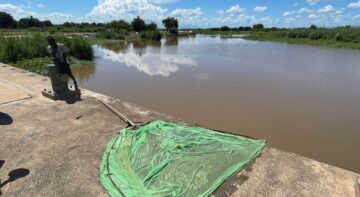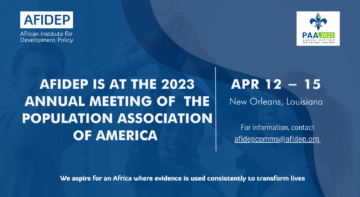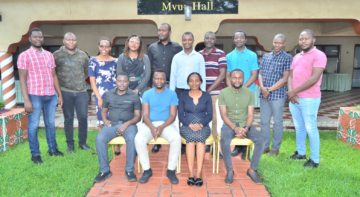Blogs

THE STORY OF AFIDEP’s GROWTH
The African Institute for Development Policy (AFIDEP)’s board of directors has decided to relocate the institute’s headquarters from Nairobi, Kenya, to Lilongwe in Malawi. The move follows the granting of diplomatic status to AFIDEP by the Government of Malawi.
While AFIDEP will continue to work closely with the rest of Africa in the search for scientifically fact-based programs on the continent, the board sees this recognition, and the State cooperation that comes with it, as strategic for the rapid growth of the institute’s activities, especially its contribution to research all over the continent. Accordingly, AFIDEP’s founder and Executive Director, Dr Eliya Zulu, moves to Malawi as AFIDEP’s Representative. Dr Rose Oronje will head the Kenya office in Nairobi. The Kenya office will operate as the East African regional base, while Malawi, led by Dr Nyovani Madise, will coordinate activities in Southern Africa.
AFIDEP was launched in Nairobi in January 2010. It has steadily distinguished itself as a renowned research and policy institute in Africa. Its focus is on six thematic areas, being:
- Population dynamics and the demographic dividend
- Health and wellbeing
- Transformative education and skills development
- Environment and climate change
- Governance and accountability
- Gender equality
When he founded AFIDEP, Dr Zulu’s goal was to fill what he saw as a gap between research findings and their use by policymakers. He wanted AFIDEP to work closely with African governments to identify knowledge gaps and ensure that evidence informs policy and program implementation for better lives.
On the evening of July 29th, 2022, friends and partners of AFIDEP met in Nairobi to recognise Dr Zulu’s role in AFIDEP’s consistent adherence to the aspirations of an Africa where evidence is consistently used to improve lives. Speakers lauded AFIDEP’s founding story and missionary agenda across Africa. They celebrated AFIDEP’s engagement with governments over the years. This engagement has afforded researchers a broader perspective in analysing, synthesising, and packaging evidence-based knowledge that policymakers can understand and use effectively.
The celebrations spotlighted AFDEP’s significant and diverse milestones over the past 12 years. AFIDEP has, for instance, provided leadership in population dynamics and development planning, focusing on investment in Africa and youth potential in socio-economic transformation in Africa. It has especially documented what African governments could do to transform the continent’s youthful populations into the driving force for a socioeconomic revolution through a demographic dividend (DD).
The objective is to galvanise Africa to take advantage of the changes in its population structure and drive socioeconomic growth. The DD is a temporary economic benefit that can arise from a significant increase in the ratio of working-age adults relative to young dependents resulting from a rapid decline in fertility and mortality. Sustained investments in education and skills development, health, job creation and good governance are required to maximise the benefits of the age structure change. AFIDEP’s work on DD across Africa informed the African Union Development Theme for 2017, “Harnessing the Demographic Dividend through Investments in Youth.” AFIDEP has worked in 25 countries. Its work has informed the inclusion of DD priorities and actions in medium and long-term development policies in 15 countries.
The celebration looked back at work done and glimpsed the future. The institute remains grateful to the Government of Kenya and partners for nurturing it through its growth stages to the giant it has become. It recognises that its growth has, over time, attracted goodwill and support from funders, academics, and friends from Africa and the global community, as exemplified through increased funding and the diversity of expertise of its staff. AFIDEP boasts a multidisciplinary team of scholars across social sciences, public health, public policy, communication for development, and a network of experts worldwide who contribute to the Institute’s work.
The Malawi office that now becomes the headquarters was opened in 2013. One of its most significant milestones has been supporting the Malawi Parliament to come up with constitutional amendments to enhance the autonomy and capacity of the legislature in steering the county’s democratic governance and socioeconomic development. In recognition of AFIDEP’s impactful work in Malawi and across Africa, the Government of Malawi granted AFIDEP diplomatic status in September 2021. The diplomatic status demonstrates the government’s commitment to providing an enabling environment for AFIDEP’s work and similar organisations. The Malawi government aspires to be a regional hub for research cultures, especially those supporting Africa’s development. This gesture should possibly attract other similar institutes to Malawi as a host country.
Dr Zulu is confident that the diplomatic status will enhance AFIDEP’s financial and operational capacity and advance its mandate in Malawi and across Africa. In particular, the diplomatic status should enable AFIDEP to attract local and global development research and policy experts to strengthen the institute’s policy and research work for the development of Africa.
Related Posts





